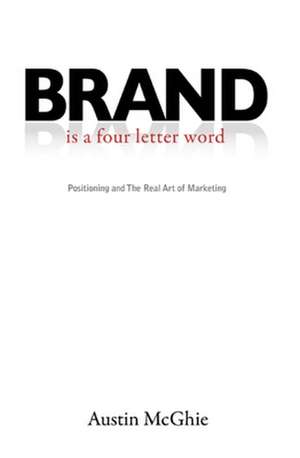Brand Is a Four Letter Word: Positioning and the Real Art of Marketing
Autor Austin McGhieen Limba Engleză Hardback – 31 mar 2012 – vârsta de la 21 până la 10 ani
Drawing on his 30-year career working with some of world’s best-known brands, including Disney, ESPN, Nike, Google, Visa, Expedia, Best Buy, Microsoft, Anheuser-Busch, Abbott and YouTube, McGhie tackles the strategic essence of positioning and creating differentiated advantage. He deftly weaves the positioning discussion throughout the book with a series of real-life anecdotes to deliver a crisp, clear view of what it means to build a brand. McGhie has written a practical book that will guide and inspire marketers and in turn help them guide and inspire their audiences.
Preț: 150.11 lei
Nou
28.72€ • 29.93$ • 23.78£
Carte indisponibilă temporar
Specificații
ISBN-10: 1599323273
Pagini: 281
Dimensiuni: 160 x 236 x 27 mm
Greutate: 0.59 kg
Editura: Advantage Media Group
Recenzii
If Sloan Wilson’s classic The Man in the Gray Flannel Suit personifies the top-down business culture of the 1950s, individuality rules today. And businesses must embrace this evolution, McGhie suggests in this perceptive exploration of evolving marketing doctrine. With the Internet impelling unprecedented cultural change, cookie-cutter conformity ensures mediocrity; the most differentiated, strongest products come from “oddball entrepreneurs.” Contrary to conventional thinking, McGhie argues that a brand is not imposed on the market but is awarded by the market; it is “a consequence, not an action.” This shift in perception manifests the need for a dialectic between producer and customer, with sincerity at the core. McGhie draws on his extensive marketing background to show how brands engage customers in company culture and persuade them to participate in the corporate “sense of mission.” Whether the reader accepts or condemns McGhie’s contention that the model of one-way persuasion is obsolete, the heightened significance of customer word-of-mouth reaction, or its electronic counterpart, seems unassailable. The customer, not the marketer, controls the brand in the brave new world of viral marketing. And McGhie’s argument that traditional marketing theories, though still adapting to new media, are not necessarily obsolete should intrigue both industry professionals and marketing neophytes. - Publishers Weekly
“Creating a world-famous brand is easy. First, create a killer product. Next, read Brand is a Four Letter Word to get an idea of the kind of very hard (but very rewarding) work you’ll need to do to really make your mark on the marketplace. There may be no shortcuts on this journey, but this book is the road map.”
—Daniel H. Pink, author of Drive and A Whole New Mind
—Jack Trout, global marketing expert and author
—Tom Yorton, CEO, Second City Communications
Notă biografică
Textul de pe ultima copertă
-- Daniel H. Pink, author of DRIVE and A WHOLE NEW MIND
--Debbie Millman, author of Brand Thinking and Other Noble Pursuits, President Emeritus of AIGA and Chair of SVA Masters in Branding
-Jack Trout, Global marketing expert and author
Cuprins
Opening Rant
SECTION 1: BRAND IS A FOUR-LETTER WORD
1. An Introduction
2. Brand (Double) Speak
3. What the Hell is a Brand Anyway?
4. Great Brands Are Built from the Inside
5. Want a Great Brand? Build a Great Product
6. A Brand is a Response, Not a Stimulus
SECTION 2 POSITION IS AN EIGHT-LETTER WORD
7. Differentiation¿Often Discussed, Seldom Achieved
8. Difference Must Be More Than Skin Deep
9. Eccentricity Rules
10. Differentiated Advantage
11. The Importance of the Missionary Position
12. Don¿t Be a Prisoner
13. Invent, Don¿t Construct
14. Love Me or Hate Me¿Just Don¿t Like Me
15. Position Narrow, Catch Wide
16. Own Something
17. Niche is Not a Four-Letter Word
18. The Joys of Disruption
19. The Disposable Strategy
20. Positioning Happens
21. Find Your Difference
22. Brand Architecture¿A Positioning Puzzle
23. The Non-Sense of Positioning
SECTION 3 MARKETING IS A NINE-LETTER WORD
(A Random Walk Through a Marketer¿s Mind¿In Six Parts)
Part 1: Thoughts You Can Use Tomorrow
24. Build Critical Marketing Mass
25. Stop Thinking Outside the Box
26. Change
27. Find the Flow
28. Think Before You Blink
29. Build an Experience
30. Make Yourself Famous
Part 2: Thoughts on the Customer
31. The Consumer is Dead
32. Your Customer is a Cynic
33. Saints and Sinners
34. Customers Not Marketing Advisors
Part 3: Thoughts on Research
35. Are You Feeling It?
36. Drowning in Information
37. The Importance of Why
38. I Like to Watch
39. Do You Know How High is Up?
Part 4: Thoughts on Communicating That Position
40. Keep It Real
41. What¿s Your Back-Story?
42. Attention¿The New Brand Currency
43. The Dollar Value of Creativity
44. A Nod to David Ogilvy
45. Assume Yoüll Only Get One Shot
46. Advertising¿And the Need for Radical Re-engineering
Part 5: Thoughts on the New World Order
47. Marketing in a World of Ubiquitous Information
48. It Takes a Village to Raise a Brand
49. The Truth Will Win Out¿Sooner Not Later
50. Catch a Virus
51. Market to the Brand Broadcaster
Part 6: Just Thoughts
52. Marketing is Judo Not Karate
53. If It¿s Not Important Enough to Win, Yoüll Lose
54. Sir Isaac¿s First Law
55. Sir Isaac¿s Second Law
56. Stop Fixing Things
57. The Brand Hijack
58. Be Careful with the Brand Keys
59. The New ROI¿Return on Imagination
60. Scenario-Based Planning¿An Idiot¿s Guide
61. Simplicity¿The Ultimate Sophistication
62. Our Infatuation with Cool
63. Technology Marketing¿It¿s Different Out There
64. Positioning You
Conclusion
A User¿s Guide to the Users Guide
About the Author
Index
